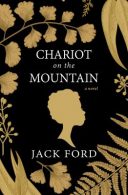 Jack Ford’s compelling, historical novel, Chariot on the Mountain, is based on little known events that took place in Rappahannock County,Virginia and Pennsylvania in 1849. On slave owner Samuel Maddox’s deathbed, he implores Mary, his wife, to free his illegitimate female daughter, Kitty, and her children. Childless Mary agrees even though it’s been difficult for her to accept the slave girl over the years as she watched her husband educate Kitty and move her to the house to work rather than the fields with most other slaves.
Jack Ford’s compelling, historical novel, Chariot on the Mountain, is based on little known events that took place in Rappahannock County,Virginia and Pennsylvania in 1849. On slave owner Samuel Maddox’s deathbed, he implores Mary, his wife, to free his illegitimate female daughter, Kitty, and her children. Childless Mary agrees even though it’s been difficult for her to accept the slave girl over the years as she watched her husband educate Kitty and move her to the house to work rather than the fields with most other slaves.
Although Mary inherited all property from her husband including his land and slaves, Samuel’s irresponsible nephew, Samuel Maddox, Jr., quickly files a lawsuit against her insisting the estate belongs to him because he is listed as the will’s heir in the event of Mary’s death. The court grants him a temporary injunction so that Mary cannot dispose of any estate property. In order to ensure that Maddox, Jr. does not gain control of her property and slaves, particularly Kitty and her children, Mary and her dear friend Fanny make plans to help Kitty and her children gain their freedom. They accompany them across state lines to Pennsylvania with the assistance of the Underground Railroad and multiple Quaker families who hide them along their way to safety. Maddox, Jr. then hires slave hunters to journey to Pennsylvania to track down and violently drag back Kitty and her children.
What happens next was unprecedented in the American legal system. Kitty sues Maddox in a ‘white peoples’ court where the trial becomes a public spectacle in their small town. Will Kitty’s suit be successful and will she be granted her freedom or will she have to stay in Virginia and remain enslaved?
You may be familiar with the author, Jack Ford, the long time CBS News legal analyst, Peabody and Emmy winner. He is also a visiting lecturer at the Yale law School where he teaches a class called ‘Trials of the Century’. Although he takes some poetic license with the facts in the story and court case, if you enjoy historical fiction and wish to learn more about slavery, civil rights and courtroom dramas, you will find this an absorbing and accessible recreation of little known facts that most Americans probably know little about.
Other novels about US slavery and the Civil War era you may have missed:
The Chaneysville Incident by David Bradley
The Last Runaway by Tracy Chevalier
The House Girl by Tara Conklin
Song Yet Sung by James McBride
I Shall Be Near To You by Erin Lindsay McCabe
Jubilee by Margaret Walker
The Kitchen House by Kathleen Grissom
The Underground Railroad by Colson Whitehead
The Widow of the South by Robert Hicks
